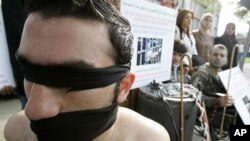The United Nations Human Rights Office says video shown on British television Monday night of people being tortured in Syrian hospitals is in line with evidence gathered by U.N. fact-finding missions. The agency says systematic torture has been going on in Syria for the past four decades.
Two United Nations investigations have documented human rights violations in Syria, including torture. Reports say the violations have been going on since 1963 and were generally carried out under the cloak of emergency legislation.
U.N. human rights spokesman Rupert Colville says Syria's security forces, which carry out alleged brutality, have immunity from prosecution by law. He says methods of torture include beatings, electric shocks, psychological torture and humiliation. He cited documented cases of injured people taken to military hospitals, where they were allegedly beaten during interrogation.
“Torture and killings reportedly took place in the Homs Military Hospital, which is the one shown in the Britain's Channel 4 footage by security forces dressed as doctors and allegedly acting with the complicity of medical personnel," he said. "In other words, what the Commission of Inquiry reported back in November is pretty much what you see both visually and in the witness account in the Channel 4 footage. As people became afraid of going to public hospitals, makeshift clinics started to be set up in mosques and in private houses and they also became targets.”
The U.N. has received testimonies saying people injured during an anti-government uprising in the last year were prevented from receiving treatment in public hospitals in several locations, including Homs.
Syria's state-run news agency, SANA, quoted President Bashar al-Assad Tuesday saying Syrians have proved their determination to pursue reform and to fight "foreign-backed terrorism," which the Syrian government blames for the nearly year-long unrest.
But Colville says the latest U.N. report, issued last month, describes how security agencies arrest wounded patients in state-run hospitals and interrogate them, often using torture.
“The Commission of Inquiry documented evidence that sections of the Homs Military Hospital and the Ladhiquiyah State Hospital had been transformed into torture centers, actually within the hospitals," said Colville. "Security agents, in some cases joined by medical staff, chained seriously injured patients to their beds, electrocuted them, beat wounded parts of their body or denied them medical attention and water. Medical personnel who did not collaborate faced reprisals.”
Last week, the U.N. rights council adopted a resolution strongly condemning violations against civilians in Syria. Two envoys on U.N. missions - U.N. humanitarian chief Valerie Amos and former U.N. secretary-general Kofi Annan - are due in Damascus this week for talks with Syrian officials in an effort to end almost a year of violence and press for international humanitarian aid.
News
UN Rights Office Documents Torture in Syria
- By Lisa Schlein




